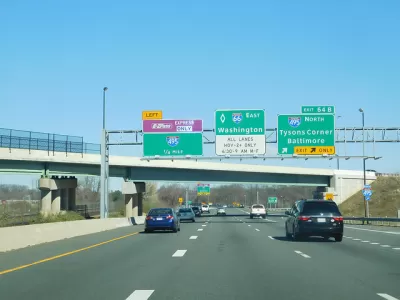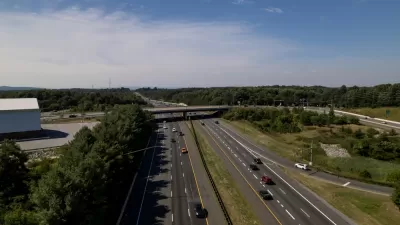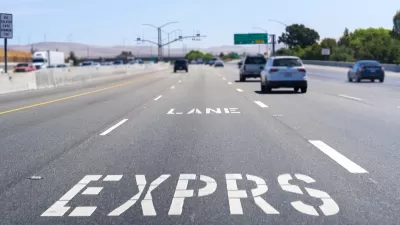Recently opened express lanes on a nine-mile stretch of Interstate 66 will now charge variable tolls based on traffic congestion.

A new set of express lanes on Virginia’s Interstate 66 with dynamic pricing are getting their first test after two weeks of toll-free driving, reports Neal Augenstein for WTOP. Drivers can see pricing, which can change every 30 minutes, about two miles before deciding whether to enter the express lanes. “The tolling system changes the price, in an attempt to ensure vehicles can maintain an average speed of 55 mph.”
“During the first Monday morning commute, the average cost was $6.10, for the entire western section, from the entrance over Route 29 in Gainesville to Route 28 in Centreville.” During the off-peak midday period, average tolls in both directions were $2.75. According to the article, the tolls will fluctuate more over time as the system ‘learns’ to become responsive to live traffic flows.
Express lanes are one example of congestion pricing, which adjusts the cost of driving by controlling traffic through a variety of mechanisms aimed at reducing congestion and encouraging off-peak travel.
FULL STORY: Is it worth it to you? What drivers are paying on new I-66 Express Lanes

Maui's Vacation Rental Debate Turns Ugly
Verbal attacks, misinformation campaigns and fistfights plague a high-stakes debate to convert thousands of vacation rentals into long-term housing.

Planetizen Federal Action Tracker
A weekly monitor of how Trump’s orders and actions are impacting planners and planning in America.

Chicago’s Ghost Rails
Just beneath the surface of the modern city lie the remnants of its expansive early 20th-century streetcar system.

Bend, Oregon Zoning Reforms Prioritize Small-Scale Housing
The city altered its zoning code to allow multi-family housing and eliminated parking mandates citywide.

Amtrak Cutting Jobs, Funding to High-Speed Rail
The agency plans to cut 10 percent of its workforce and has confirmed it will not fund new high-speed rail projects.

LA Denies Basic Services to Unhoused Residents
The city has repeatedly failed to respond to requests for trash pickup at encampment sites, and eliminated a program that provided mobile showers and toilets.
Urban Design for Planners 1: Software Tools
This six-course series explores essential urban design concepts using open source software and equips planners with the tools they need to participate fully in the urban design process.
Planning for Universal Design
Learn the tools for implementing Universal Design in planning regulations.
planning NEXT
Appalachian Highlands Housing Partners
Mpact (founded as Rail~Volution)
City of Camden Redevelopment Agency
City of Astoria
City of Portland
City of Laramie





























